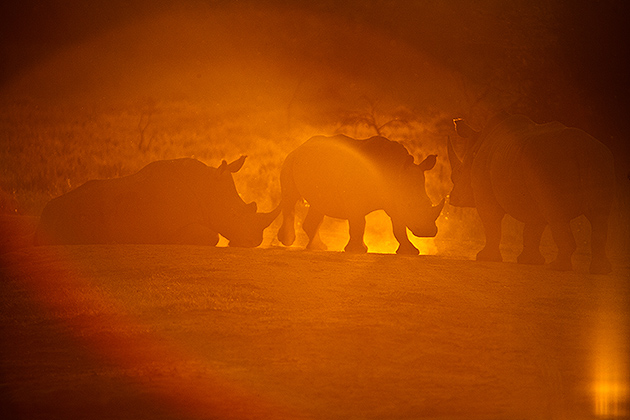One of UConn Today’s journalists reports on the experiences of a UConn senior whom she met when she traveled to South Africa this past summer. The story, which is told in two installments, is part of a special four-part series.

For UConn senior Alana Russell ’13 (CANR), wildlife conservation signifies far more than the subject matter that she reads about in class. The natural resources major spent her summer face-to-face with the devastating facts and figures confronting endangered wild animals – especially after she took on an unexpected role in the life of one baby rhino.
As part of an African field ecology course taught by her advisor, Morty Ortega, associate professor in the College of Agriculture and Natural Resources, Russell traveled to South Africa this past June. Following a spring semester class in a lecture hall on the Storrs campus, the course culminated in a three-week trip over the summer to Entabeni Game Reserve, a private reserve located in the South African bush. There, students are immersed in hands-on field ecology instruction for up to 15 hours a day.
“It’s something I’ve always wanted to do,” Russell says about visiting Africa. “You see it in the media, in books, in movies, and it’s something you can never grasp until you come here.”
During their time at the reserve, UConn students attend various lectures – one of which focuses on the widespread problem of poaching. Several days into the three-week trip, Russell recalls sitting in this lecture and seeing the gruesome photographs passed around the classroom depicting a rhino discovered by an anti-poaching unit. The victim’s horns had been hacked off, and its calf stood helplessly next to the mother’s mutilated body.
“That picture of the mom that had been poached and the calf standing there – it just got to me, and I thought, “Wow, I wish I could do something about that,” Russell says.
She would soon be doing far more than she could have imagined.
Dwindling Numbers
Even today in the African bush, the illegal poaching of rhinos is escalating unabated, a constant threat to the large land mammals’ already decimated populations.

Last year, 448 rhinos were poached in South Africa alone for horns that are prized in certain cultures for their ornamental and alleged medicinal uses, as well as for their monetary value. Today, just 1 kilogram of rhino horn will fetch up to $60,000 on the black market. In fact, the profitability of the world’s illegal wildlife trade now stands second only to the drugs trade.
Poaching, in even cruder, crueler forms, continues to increase exponentially each year, yet just 5 percent to 6 percent of poachers are convicted for their offenses. By August of this year, already more than 250 rhino poachings were reported across South Africa – and these figures do not include the many baby rhinos that are orphaned and left for dead by their mother’s side.
Until recently, anti-poaching units that tracked down the scenes of these grisly crimes resorted to shooting any orphaned rhinos they found, having no facilities available that could care properly for these creatures.
This past summer, however, things started to change. Plans had been in the works in South Africa to open the world’s first dedicated baby rhino orphanage, with the goal of caring for and rehabilitating rhinos orphaned by poaching before ultimately releasing them back into the wild.
Around the same time that Russell set eyes on the poaching photographs, the orphanage-to-be had been notified of a young black rhino found in the Kalahari Desert. The starving calf, about two months old, was suffering from a prolapsed rectum, a result of having eaten sand for an estimated two weeks.
With the rhino urgently in need of 24-hour care, the orphanage turned to the Entabeni Nature Conservancy for additional help. At Ortega’s recommendation, Russell’s name surfaced early on – and her reaction to the prospect of serving as caregiver affirmed Ortega’s decision to recruit her.
“I asked if she wanted to take the opportunity of helping on a project in which she was going to have to take care of a baby rhino. Immediately, she started crying,” Ortega says. “Her reaction to me was a very positive answer: She was the person that would care about a baby [rhino] more than anybody else on the camp at the time.”
Before she knew it, Russell was abandoning the three-week field ecology coursework and emailing home to inform her family that she would not, after all, be returning home at the end of the school trip. She would be staying for the rest of the summer break to be a mother – to a black rhino.
For the second part of this story, click here.
Other stories in the series are Hands-on UConn Course Takes Students on African Journey and A City Girl in South Africa: Training to Become a Nature Guide.
To learn more about the three-week African field ecology course, which fulfills a General Education requirement, visit http://bit.ly/RgJM3C. To learn more and to support the Rhino Orphanage, ‘Like’ facebook.com/TheRhinoOrphanage or follow @RhinoOrphanage on Twitter.



